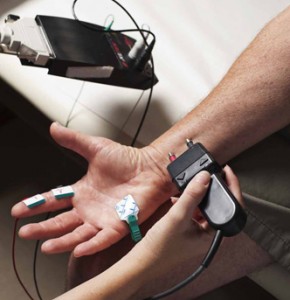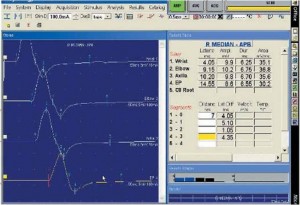Nerve Conductions Studies (NCV)
These tests are done to help diagnose nerve and muscle problems that might cause symptoms of numbness, tingling, pain, weakness, and/or cramping.
NCSs show how the body’s nerves are working. The testing physician will apply small electrical shocks and record from surface electrodes touching the skin. No needles are involved, but there may be some discomfort from mild shocks.
EMG studies are done to examine the muscle for signs of weakness and other abnormalities. The EMG test consists of a thin needle inserted into a muscle. Shocks are not administered during EMG testing. The EMG needles are much thinner than the needles that would be used to draw your blood. A new sterile needle is used for each patient and is discarded after the test. There may some discomfort when the needle is inserted.
Which conditions require NCV?
Nerve conduction studies is recommended for the following diseases:
- Neuropathy or nerve abnormality
- Connective tissue diseases
- Injury to the nerves
- Carpal tunnel syndrome
- Cervical/lumbar disc prolapse
- Toxic effects of medications such as drugs taken for treatment of tuberculosis/ cancer
- Guillain Barre Syndrome
- Hereditary Neuropathy
- Myasthenia.
What are the symptoms of nerve involvement?
Symptoms of nerve involvement:
- Tingling, numbness of hands/feet.
- Burning sensation / pain in the hands and feet.
- Decreased sensation in arms/legs.
- Weakness /thinning of arms and legs.
What to do before the test?
- Take a bath or shower to remove oil from your skin.
- Do not use oil, body lotion or powder on your arms or legs on the day of the test
- Wear loose clothes as this will allow easy examination.
- Provide a list of all your medications, especially if you are taking blood thinners (aspirin or warfarin), or have a bleeding disorder (such as hemophilia).
- Medications can be taken the day of the testing unless your referring physician tells you differently. If you have myasthenia gravis, it is especially important that you ask your referring physician if you should take your medication on the day of the test.
- You can eat before the test. Fasting is not required.
- For children who are uncooperative, sedation may be required.
- There is no after effect following the test.
- This is done as an outpatient procedure.
How is the procedure done?
Details of Procedure
- Test usually takes 20-30minutes.
- Metal disc plates (electrodes) are placed on the skin over nerves and muscles, mild electrical stimulation is given and the response is recorded.
- Usually two nerves in upper limbs and two nerves in lower limbs are tested.
- It may be necessary to test more nerves depending on the neurological disease.
ELECTROMYOGRAPHY (EMG)
The EMG test is used to evaluate the status of the muscles, nerves, roots and anterior horn cells. A number of neurological disorders present with weakness or atrophy (thinning) of muscles.
Which conditions require EMG?
Some common disorders are:
- Muscular dystrophy.
- Myopathy.
- Neuropathy.
- Carpal tunnel syndrome.
- Nerve injuries.
- Cervical/lumbar radiculopathy.
- Motor neuron diseases.
The EMG may be done either alone or in combination with nerve conduction studies (NCS) depending on the neurological disorder.
Common symptoms of muscle involvement:
- Difficulty in climbing stairs.
- Difficulty in getting up from sitting/squatting position.
- Difficulty in performing movements like buttoning, breaking chapatis, mixing food, combing hair.
- Raising hands above the head.
How is EMG done?
Details of Procedure:
- A thin disposable EMG needle is inserted into the muscle to be examined. Depending on the type of disease one or more muscles may be required to be tested.
- You may experience mild pain during the procedure.
- There is no risk of transmitting the infection since disposable needles are used and they are destroyed after use.
- You can have your regular food and medication on the day of the test.
- You should wear loose clothes so that the test can be easily done.
How much does EMG cost ?
Cost of procedure is approx. Rs 2500 for two limbs and 4500 for four limbs. An EMG needle costs Rs 500, which needs to be purchased separately.

